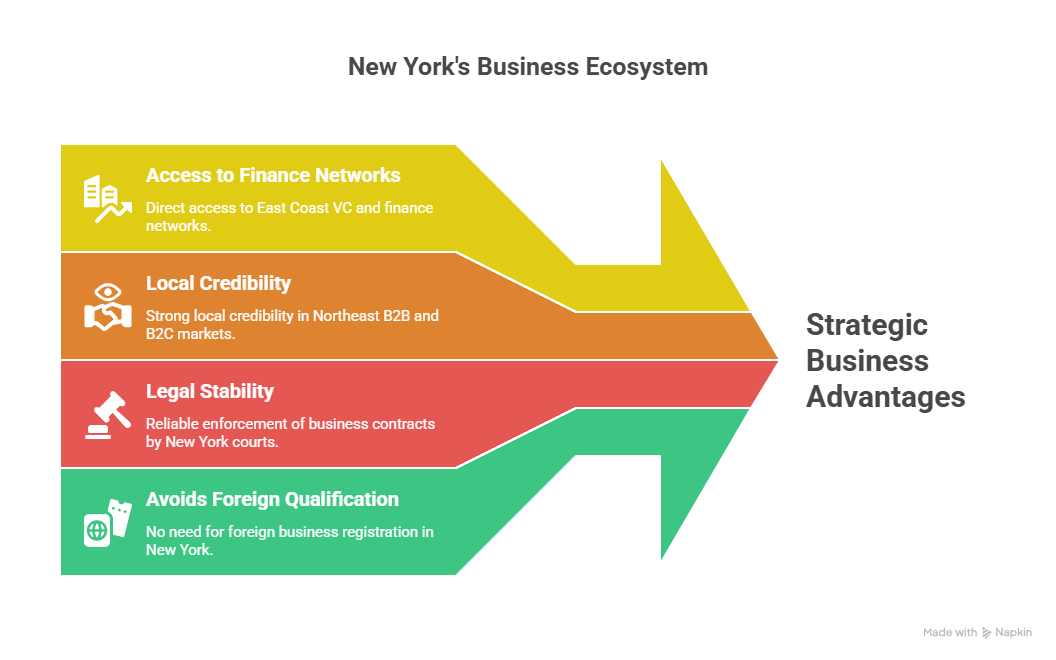New York is not only a global financial powerhouse but also a hub for innovation, media, fashion, biotech, and tech startups. For founders aiming to establish a U.S. presence, incorporating in New York offers both strategic visibility and access to deep capital markets. This article walks you through the process of incorporating a company in New York -specifically a C-Corporation, the structure most favored by startups and investors – and explores the advantages and practical considerations.
We also explain how outsourcing your financial operations can streamline the journey, especially with ERB as a trusted partner for growing startups.
Why Incorporate in New York?
Many international and domestic startups choose Delaware as a default, but if your startup will operate in New York – hire employees, serve customers, or raise local funding – it often makes sense to incorporate directly in-state.
Key Advantages:
- Access to East Coast VC and finance networks (Wall Street, Midtown accelerators, etc.)
- Local credibility for B2B and B2C markets based in the Northeast
- Legal stability: New York courts, particularly the Commercial Division, have a strong reputation for enforcing business contracts
- Avoids foreign qualification: Unlike a Delaware corporation, a New York entity doesn’t need to register as a “foreign” business if it’s operating in NY.

Step-by-Step: Incorporating a C-Corp in New York
Here’s a simplified guide for forming your company legally and effectively:
1. Choose a Business Name
- Your name must be unique and not misleading
- It must include “Corporation,” “Incorporated,” “Limited,” or an abbreviation (Corp., Inc., Ltd.)
- You can check name availability using the NYS Department of State (DOS) online tool
2. Appoint a Registered Agent
- Your corporation must have a registered agent with a physical NY address to receive legal documents
- You may act as your own agent, or use a professional service
3. File the Certificate of Incorporation
- File Certificate of Incorporation (Form DOS 1239) with the NY Department of State
- Filing fee is $125 (can be paid online, by mail, or in person)
- Basic information required includes:
- Corporate name
- County where office is located (not a physical address)
- Number of authorized shares
- Registered agent name and address
4. Create Corporate Bylaws
- While not filed with the state, bylaws are internal rules that govern how the company will be run
- They cover things like meetings, voting, shareholder rights, etc.
- Bylaws are essential for opening bank accounts and establishing investor trust
5. Hold an Organizational Meeting
The board of directors (or incorporator) must adopt the bylaws, appoint officers, and authorize the issuance of stock
6. Obtain an EIN (Employer Identification Number)
- Apply via the IRS (Form SS-4) online – free and instant if you have a U.S. taxpayer ID
- Required for taxes, payroll, and opening a bank account.
7. File Biennial Statement
- Every two years, your company must file a Biennial Statement with the NY DOS
- The filing fee is $9, and the statement includes:
Name and address of CEO
Address where process is served
Post-Incorporation Essentials
✔ Open a U.S. Business Bank Account
After receiving your EIN and Certificate of Incorporation, you can open a corporate bank account. Some banks require U.S. presence or a visit to a branch, while fintech platforms like Mercury or Relay may offer remote account setup for international founders.
✔ Register for New York Taxes and Payroll
If you’re hiring employees or doing business in-state:
- Register with the New York State Department of Taxation and Finance
- Register for Unemployment Insurance and Withholding Tax
- Comply with NY labor laws, including wage reporting and insurance
Pros of Incorporating in New York for Startups
| Benefit | Description |
|---|---|
| Strategic Location | Close proximity to NYC’s investment and startup ecosystem |
| Legal Clarity | Robust legal system for enforcing contracts and corporate governance |
| Operational Simplicity | No need to foreign-register if physically operating in NY |
| Local Funding Access | More appealing to New York-based VCs and grants |
| Customer Trust | Perceived as a local company in the NY market |
Considerations and Challenges
- State Taxes: New York has both corporate and franchise taxes, so be prepared for annual compliance.
- Higher Costs: Incorporating and operating in New York can involve higher legal and professional fees compared to other states.
- More Paperwork: Biennial reports, state compliance, and labor registrations require careful attention.
Why Work With ERB?
Incorporating is just the beginning. As your startup grows, financial operations become complex – payroll, investor reporting, compliance, and bookkeeping all require expert attention. That’s where ERB comes in.
ERB provides outsourced CFO, payroll, and accounting services, tailored specifically for startups operating in the U.S. We understand the unique challenges foreign and domestic founders face, and we help you:
✅ Stay compliant with state and federal tax rules
✅ Set up and manage U.S. payroll
✅ Create investor-ready financial reports
✅ Get strategic guidance from an experienced CFO
✅ Avoid costly legal or accounting mistakes
With ERB on your side, you can focus on building your product and growing your market, while we handle the financial foundation.
Ready to Launch in New York?
Whether you’re a tech startup opening your first U.S. branch or an international founder expanding into one of the world’s most influential markets – New York offers opportunity, visibility, and reach. With the right financial partner, you can hit the ground running.
Let ERB be your trusted bridge to success in the U.S. startup landscape.
Another article about:
Incorporating a U.S. C-Corporation: Delaware vs California vs New York

